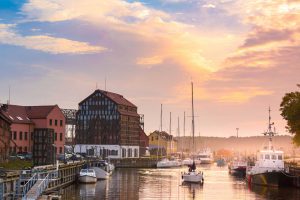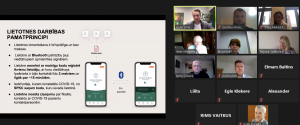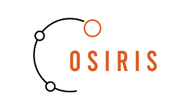Innovation camps: Open innovation toolkit
WP3 GA 3.3: Innovation Camps: Open Innovation Toolkit
16th-17th September, 29th October & 10th November 2020
1st Innovation Camp, hosted by Klaipeda State University of Applied Sciences

Social Media 1st Innovation camp
Moving forward with Interreg BSR 2014-2020 project “OSIRIS” activities aiming to realize open innovation toolkit 1st Innovation Camp, hosted by Klaipeda State University of Applied Sciences was held in Klaipėda, Lithuania, on 16-17 September 2020. Caused by 2020 pandemic situation it was organized in unlike regular format and was innovative with an entirely virtual participation process. Nevertheless, participants, representing triple helix actors (from government, research and scientific institutions, companies, were interactively engaged in the 2 days camp session. Existing in practice innovation tools were presented by Lithuanian innovation centre (Dr. Ingrida Tinfavičienė) and Baltic Maritime Digital Innovation Hub (Innovation director Ignas Aničas). During the panel discussions, participants shared knowledge, critical observations and insights about presented existing open innovation tools and methodologies.
2 more Innovation Camps are going to be conducted in order to select final open innovation tools, establish testing scenarios and concluding with validation of selected final open innovation toolkit. #OSIRISInterregBSR #Silvereconomy #InterregBSR #Smartspecialization #Innovationcamp #KVK
2nd Innovation Camp in Latvia: The method of design thinking to expand the usage of “Stop Covid” app among the senior population.

Last Week on October 29 Team of Riga Technical University as part of the Osiris Project organized workshop “The method of design thinking to expand the usage of “Stop Covid” app among the senior population.” The app itself was a non-commercial initiative, that was made possible by the involvement of state agencies, universities, private tech companies and many other actors, driven by the sole goal limiting the spread of COVID-19 by enabling smartphone-based contact tracing in Latvia.
As the user base is key to the success of such platforms, it is essential to expand the user base of the app in the most vulnerable groups. The workshop took place via Zoom and involved representatives of Riga Technical University, Latvian Mobile Telephone, media agency Deep White and the developer MakIT. After presentations regarding the functionality, communication activities and design thinking, structured interviews were held with selected seniors to identify to challenges of effective communication and increasing the awareness of the app, while overcoming mistrust and disinformation, that is actively spreading following the second wave of COVID-19 in Europe.
Both the workshop and the “Stop COVID” initiative is are good examples of the advantages of quadruple helix approach to problem-solving on a bigger scale.
3rd Innovation Camp
The Third Innovation Camp took place virtually from Denmark on November 10. The aim of the innovation camp was to present and discuss the validation and descriptions of the open innovation toolkit by extension, participants also used the opportunity to discuss the potential visualization and finalization of the toolkit.
The participants in the virtual innovation camp were representatives of partners from the Interreg Baltic Sea Region together with other stakeholders. During the Innovation Camp Co-founder of Guiden65, Sussi Bianco made a presentation of the Danish website Guiden65.dk.
Based on a presentation of a potential visualization of the toolkit, the participants presented their first initial thoughts and comments of the presented Ecosystem Pie Model. Afterwards, the partners were divided into groups to discuss the visual impression and the categories used in the toolkit: “Ideation”, “design/prototyping”, “assessment” and “networking”.
The meeting ended with a plan for the completion of the OSIRIS Toolkit. After this, the completed work is handed over to the production of the Smart Silver Lab. The third and final Innovation Camp can be viewed as a success, as its goals were successfully met.



